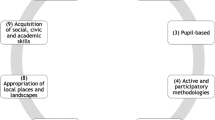Abstract
In Malaysia, various efforts have been introduced to increase the knowledge, skills and awareness of citizens to the benefit of the environment by means of a variety of programmes. However, uncertainty about the effectiveness of environmental education programmes and the way they contribute to sustainability still exists. This paper reports on an evaluation of the Kelab Pencinta Alam (KPA) (School Nature Clubs) programme organised by the Malaysia Nature Society and the Forest Research Institute of Malaysia. The Kellogg Logic Model was used as an evaluative instrument as the impact of the programme had to be determined. This was done through questionnaires to teachers and principals in KPA schools. School visits were also undertaken to evaluate workplace success and to validate the findings from the questionnaires. Overall, the evaluation showed a high level of success for the programme.






Similar content being viewed by others
References
Anderson, A. (n.d.). The community builder’s approach to theory of change. A practical guide to theory development. New York: Aspen Institute.
Babbie, E., & Mouton, J. (2011). The practice of social research. Cape Town: Oxford University Press.
Denzin, N. K. (1978). The research act: A theoretical introduction to sociological methods. New York: McGraw-Hill.
Guion, L.A. & Free T.R. (2010). A conceptual framework for infusing behavior change theories into program design, delivery, and evaluation: A financial education example. Forum for family and consumer issues 15(1). North Carolina State University. Accessed on 01 January 2014 at http://ncsu.edu/ffci/publications/2010/v15-n1-2010-spring/index-v15-n1-march-2010.php.
Gumal, M. T., & Suliman, J. (1997). Development of environmental education in Sarawak. In K. A. Pan & B. L. Lim (Eds.), Proceedings of the first national workshop on environmental education: Strengthening development of environmental education in Malaysia (pp. 51–60). Kuala Lumpur: Department of Wildlife and Parks (PERHILITAN).
Hopkins, C., & McKeown, R. (2002). Education for sustainable development: An international perspective. In D. Tilbury, R. B. Stevenson, J. Fien, & D. Schreuder (Eds.), Education and sustainability responding to the global challenge (pp. 13–24). Gland: IUCN commission on education and communication CEC.
Kellogg Foundation. (2010). The kellogg logic model development guide. http://www.wkkf.org/knowledge-center/resources/2010/Logic-Model-Development-Guide.aspx. Accessed on 14 February 2012.
Kementerian Pelajaran Malaysia. (1998). Buku Penduan Guru Pendidikan Alam Sekitar Merentas Kurikulum KBSR dan KBSM. Kuala Lumpur: Curriculum Development Divisions, MOE.
Malaysia. (1998). Malaysia’s National policy on biological diversity. Kuala Lumpur: Ministry of Science, Environment and Technology.
Malaysia. (1998). Ministry of Education. Handbook of environmental education cross curriculum. Kuala Lumpur: Curriculum Development Centre.
Malaysia. (2002). Malaysia’s National Policy on the Environment. Kuala Lumpur: Department of Environment.
Malaysia. (2004). National Integrity Plan. Kuala Lumpur: Ministry of Education.
Malaysia. (2005). Ministry of Education Malaysia. Letter from General Secretary to WWF- Malaysia dated 22/2/2005 with reference no: PK(KSU)01/3.
Mc Millan, J. H., & Scumacher, S. (2006). Research in education. Evidence-based enquiry. Boston: Pearson.
Mouton, J. (2006). Understanding social research. Pretoria: Van Schaik.
Nadeson, T., & Nor Shidawati, A.R. (2006). The implementation of environmental education in Malaysian schools: An NGO’s overview. In Y. Noor Azlin, E. Philip, & T. Ong (eds). Proceedings of the Conference on Best of Both Worlds: Environmental Education for Sustainable Development. (pp. 41–50) Kepong: Forest Research Institute Malaysia.
Noor Azlin, Y., Chong, C.M., & Azyyati, A.K. (2006). The implementation of environmental education in Malaysian schools : An NGO’s overview”. In Y. Noor Azlin, E. Philip, & T. Ong (Eds.) Proceedings of the Conference on best of both worlds: Environmental education for sustainable development. (pp. 79–84). Kepong: Forest Research Institute Malaysia.
O’Donoghue, T., & Punch, K. (2003). Qualitative educational research in action: Doing and reflecting. London: Routledge Falmer.
Omar, J. (1997). Implementation of environmental education through the nature club scheme in Sabah. In K. A. Pan & B. L. Lim (Eds.), Proceedings of the first national workshop on environmental education: Strengthening development of environmental education in Malaysia (pp. 67–71). Kuala Lumpur: Department of Wildlife and Parks (PERHILITAN).
UNESCO. (1992). United Nations Conference on Environment and Development: Agenda 21. UNESCO, Switzerland. Chapter 36, p. 13.
Weiss, C. H. (2000). Theory-based evaluation: Theories of change for poverty reduction programs. In O. Feinstein & R. Picciotto (Eds.), Evaluation and poverty reduction. Washington, D.C: Operations Evaluation Department, The World Bank.
EPA see United States Environmental Protection Agency.
Acknowledgments
Financial support for the programmes was sourced from the Timber Levy Fund of the Ministry of Plantation Industries and Commodities, Malaysia, which is gratefully acknowledged. The authors are also indebted to many FRIM and Malaysian Nature Society staff for information and field assistance.
Author information
Authors and Affiliations
Corresponding author
Rights and permissions
About this article
Cite this article
Loubser, C., Noor Azlin, Y., Dreyer, J. et al. The effectiveness of environmental education workshops for teachers, learners and schools in Malaysia. Environ Dev Sustain 16, 1163–1176 (2014). https://doi.org/10.1007/s10668-014-9518-9
Received:
Accepted:
Published:
Issue Date:
DOI: https://doi.org/10.1007/s10668-014-9518-9




